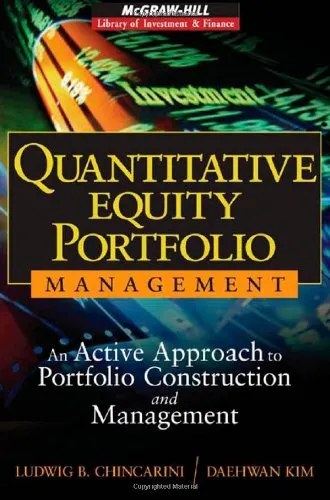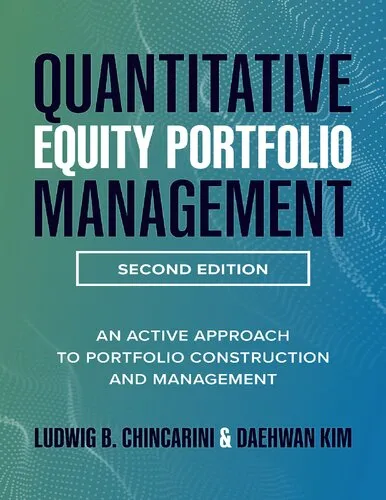Quantitative Equity Portfolio Management: An Active Approach to Portfolio Construction and Management (McGraw-Hill Library of Investment and Finance)
5.0
بر اساس نظر کاربران

شما میتونید سوالاتتون در باره کتاب رو از هوش مصنوعیش بعد از ورود بپرسید
هر دانلود یا پرسش از هوش مصنوعی 2 امتیاز لازم دارد، برای بدست آوردن امتیاز رایگان، به صفحه ی راهنمای امتیازات سر بزنید و یک سری کار ارزشمند انجام بدینکتاب های مرتبط:
مقدمهای بر کتاب 'Quantitative Equity Portfolio Management'
کتاب 'Quantitative Equity Portfolio Management: An Active Approach to Portfolio Construction and Management' یکی از منابع ارزشمند در زمینهٔ مدیریت پورتفویهای سرمایهگذاری سمت فعال است. این کتاب که توسط 'Ludwig B Chincarini' و 'Daehwan Kim' نوشته شده است، به موضوعات پیچیده و مدرن مدیریت پورتفوی سهام به گونهای عملی و کاربردی پرداخته است. هدف اصلی این کتاب ارائهٔ تکنیکها و استراتژیهای کمی است که میتوانند به طور موثری در کسب مزیت رقابتی نسبت به بازار مفید واقع شوند.
خلاصهای دقیق از کتاب
این کتاب به سه بخش اصلی تقسیم شده است؛ بخش اول به مبانی مدیریت پورتفوی و روشهای مختلف تحلیل و ارزیابی پورتفوی میپردازد. در این بخش، ایدههای کلیدی مانند نظریه مدرن پرتفوی، CAPM و شاخصهای عملکرد مالی به تفصیل بحث میشود. بخش دوم به تکنیکهای کمی برای ساخت پورتفوی میپردازد، جایی که نویسندگان نشان میدهند چگونه میتوان از مدلهای Quantitative برای بهینهسازی سبد سهام استفاده کرد. نهایتاً، در بخش سوم تمرکز بر مدیریت فعال و راهبردهای تحلیلی مانند استراتژیهای معاملاتی و ارزیابی عملکرد است.
نکات کلیدی
- تعریف و اهمیت Quantitative Equity Portfolio Management.
- نقش مدلهای کمی در بهینهسازی پورتفوی.
- تکنیکهای فعال مدیریت پورتفوی برای کسب سود بیشتر.
- ارزیابی ریسک و مدیریت آن در چارچوب یک پورتفوی فعال.
نقلقولهای معروف از کتاب
"Quantitative techniques are the tools, but judgment and experience are the overseers."
"Active management is not about beating the market; it's about achieving the client’s objectives."
چرا این کتاب اهمیت دارد
در دنیای سرمایهگذاری مدرن، کتابهای مرجع در زمینهٔ مدیریت پورتفوی که بتوانند دانش روز و عملی را انتقال دهند بسیار کم و نایاباند. کتاب 'Quantitative Equity Portfolio Management' با ارائه رویکردی فعال و کمی، به مدیران و معاملهگران اجازه میدهد تا با استفاده از الگوریتمهای پیشرفته و مدلهای Quantitative، به استراتژیهای جامع و موفقتری دست یابند.
علاوه بر این، این کتاب نگاه جامعتری به مدیریت پورتفوی ارائه میدهد که نه تنها بر مبانی نظری تکیه دارد، بلکه با ارائه مثالهای واقعی و مطالعات موردی، خوانندگان را به درک عملی از مباحث وادار میکند. به این ترتیب، این کتاب نه تنها برای حرفهایها، بلکه برای دانشجویان و کسانی که به تازگی وارد دنیای مالی شدهاند نیز منبع مناسبی دارد.
Welcome to an in-depth exploration of Quantitative Equity Portfolio Management, a seminal work in the vast landscape of investment and finance. Written by seasoned experts Ludwig B Chincarini and Daehwan Kim, this book serves as an essential guide for anyone looking to delve into the complexities of quantitative approaches to equity portfolio management. Whether you're a budding investor or a seasoned portfolio manager, this book provides the tools, techniques, and insights necessary for a comprehensive understanding of active portfolio management through quantitative methods.
Detailed Summary of the Book
Quantitative Equity Portfolio Management is an extensive resource that bridges the gap between theoretical finance and practical application. It begins with an introduction to quantitative methods and statistical techniques, carefully laying the foundation needed to comprehend the more advanced concepts that follow. The book explains the principles of constructing quantitative equity portfolios, focusing on the importance of diversification, asset allocation, and risk management. A significant portion of the book is dedicated to investment strategies, including factor models, alpha signals, and the use of quantitative signals to enhance portfolio returns.
Furthermore, the authors delve into sophisticated topics such as optimization techniques, backtesting strategies, and performance evaluation metrics. Real-world examples and case studies underscore the practicality of the concepts discussed, providing readers with concrete illustrations of how these methods are applied in the finance industry.
Key Takeaways
The book offers many insights and strategies critical for quantitative investing. Here are some key takeaways:
- Understanding Quantitative Models: Learn to develop and deploy quantitative models that can systematically process financial data to generate investment insights.
- Diversification and Risk Management: Discover techniques to diversify effectively while managing portfolio risk through quantitative solutions.
- Enhancing Returns: Gain knowledge on leveraging factor investing, alpha generation, and backtesting to potentially increase returns.
- Performance Measurement: Master the art of evaluating portfolio performance using a variety of metrics and frameworks.
Famous Quotes from the Book
“In the world of quantitative finance, models are not just tools—they are frameworks for understanding complex market behaviors.”
“Quantitative equity portfolio management marries the science of numbers with the art of investment judgment.”
Why This Book Matters
This book is pivotal for a multitude of reasons. It offers a comprehensive guide to quantitative approaches, which are increasingly central to modern finance. In an era where data-driven decision-making is paramount, understanding and applying quantitative techniques can provide a substantial edge to investors and financial professionals.
Moreover, the book's practical approach, with its focus on real-world application, empowers its readers to directly implement the strategies discussed. This practical orientation ensures that readers are not just learning theoretical concepts but are also equipped to apply these strategies effectively within the dynamic contexts of financial markets.
Ultimately, Quantitative Equity Portfolio Management serves as a critical resource, providing the skills and insights necessary to succeed in today's data-dominated investment landscape.
دانلود رایگان مستقیم
شما میتونید سوالاتتون در باره کتاب رو از هوش مصنوعیش بعد از ورود بپرسید
دسترسی به کتابها از طریق پلتفرمهای قانونی و کتابخانههای عمومی نه تنها از حقوق نویسندگان و ناشران حمایت میکند، بلکه به پایداری فرهنگ کتابخوانی نیز کمک میرساند. پیش از دانلود، لحظهای به بررسی این گزینهها فکر کنید.
این کتاب رو در پلتفرم های دیگه ببینید
WorldCat به شما کمک میکنه تا کتاب ها رو در کتابخانه های سراسر دنیا پیدا کنید
امتیازها، نظرات تخصصی و صحبت ها درباره کتاب را در Goodreads ببینید
کتابهای کمیاب یا دست دوم را در AbeBooks پیدا کنید و بخرید
1312
بازدید5.0
امتیاز51
نظر98%
رضایتنظرات:
5.0
بر اساس 1 نظر کاربران
"کیفیت چاپ عالی بود، خیلی راضیام"
harsh419
8 سپتامبر 2025، ساعت 17:12
This book is all you need to learn about equity portfolio management.
Questions & Answers
Ask questions about this book or help others by answering
No questions yet. Be the first to ask!














